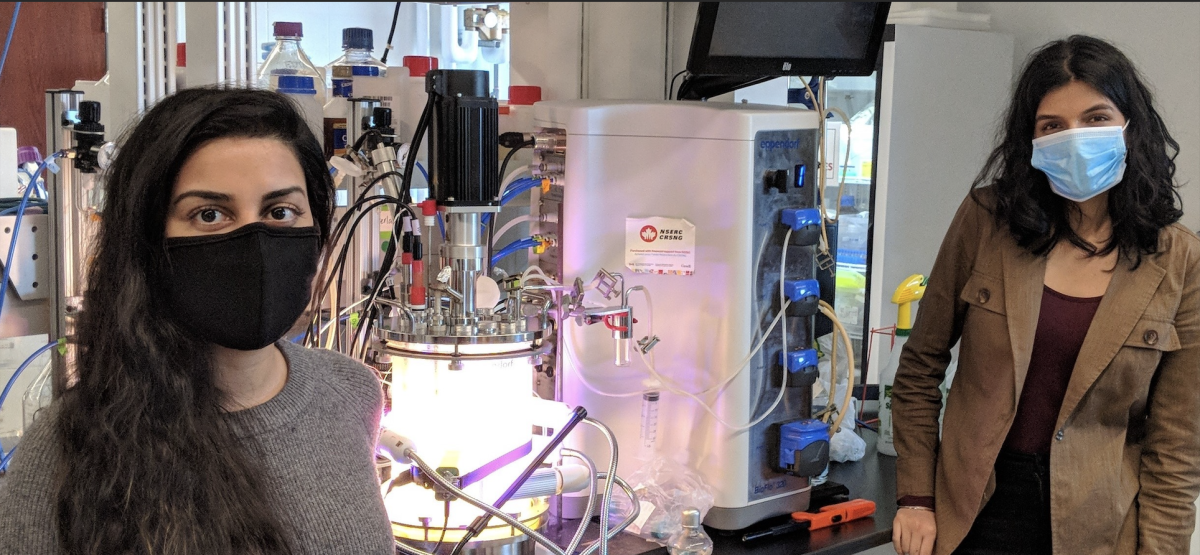Support strong Canadian climate journalism for 2025
Myra Arshad knows fast fashion can be oppressive to workers and damaging to the environment. She’s determined to do something about both, and may help solve the food waste problem along the way.
“We essentially take one of the world's largest landfill contributors, which is food waste, and we convert it into what we believe will be the world's most sustainable polyester alternative,” Arshad, a business school graduate and serial entrepreneur, says about ALT TEX, the company she co-founded with her best friend, biochemist Avneet Ghotra.
The pair and the growing team behind the young biotech company have validated the science behind their “waste to wardrobe” three-step process and are now growing their operation after recently raising $1.5 million, which allowed them to buy a key piece of machinery (a polyester melt extruder), secure more space, and start paying themselves.
They want to go much further.
“We want to take this global because we truly believe this technology can effectively replace polyester,” Arshad said in a video interview, noting the source fibre they create could be turned into textile on the existing equipment for the fossil fuel-based version, meaning, “this should not be a premium product for a very, very long time.”
But Arshad said they are also not trying to meet polyester’s price floor and would instead stress that cheap T-shirts often come at the expense of someone else’s livelihood.
Knowing that would mean that at some point manufacturing would need to happen globally, she says they’ve “taken the early steps to ensure that it goes to the right hands, and it's not just this sustainable, ethical fibre that then goes to forced labour factories.”
Arshad's family emigrated to Canada when she was very young, and it was her mother's cut-and-sew business that kept her family fed, Arshad recalls. Her mother has already said she'll sew the first run of fabric into a garment.
“Back home in Pakistan we still have some ties to the textile manufacturing industry,” Arshad said. "That connection is still very much alive. She's really excited.”
The company projects that a T-shirt made from ALT TEX fabric could divert a kilogram of food waste from landfill, while Canada wastes 35 million tonnes of food, or almost 60 per cent of all the food produced here annually. Food waste releases methane, a greenhouse gas.
The process involves collecting post-industrial food waste from food manufacturers. The waste is rich in various sugars and other resources that go through their fermentation technology to create a biopolymer.
While the fabric they ultimately produce would still shed microfibres, it could be expected to degrade in water at a similar rate to cotton, unlike the traditional plastic form in polyester that blights waterways and oceans worldwide.
“We’re definitely trying to solve two Canadian problems that are very real right now,” Arshad said, adding that they are aiming to produce the fabric by the middle of next year.
The company had previously been funded by a mix of grants, pitch competitions and other non-dilutive sources, adding up to $200,000.
Seeking $400,000 to purchase the machinery they needed, the company ended up collecting much more than that from investors willing to back the team, all women in their 20s who Arshad said people didn’t always take seriously before their raise.
Arshad said that generational angst has created the company’s drive, leading to resourcefulness that outweighs the deep pockets of larger companies that might have been expected to fix the problem.
“This generation is the generation that’s faced with all these impending problems with climate change, and it’s really on us to take ownership and fix them.”
Morgan Sharp / Local Journalism Initiative / Canada’s National Observer





Comments